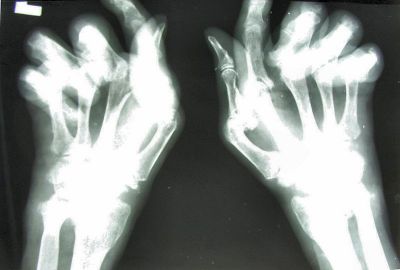The genes behind arthritis

Reumatoidalne zapalenie stawów na zdjęciu RTG, fot. public domain
Rheumatoid arthritis (RA) is an incurable autoimmune condition affecting millions of people around the world. EU-funded researchers investigated the gene variants implicated in predisposition to RA.
Through genome-wide association studies, scientists identified regions
in the genome that increase predisposition to RA but not the actual
genes responsible. This is due to the complexity of associating genotype
to phenotype in RA and other autoimmune conditions.
Tumour necrosis factor alpha-induced protein 3 (TNFAIP3) negatively
regulates NF-kappaB and helps inhibit TNF-receptor–mediated signalling
effects. Intergenic region (IGR) refers to DNA sequences located between
genes. The IGR upstream TNFAIP3 was linked to autoimmune conditions
such as RA, type 1 diabetes, inflammatory bowel disease and systemic
lupus erythematosus.
The GENTOPHEN project focused on identifying the variants in the
TNFAIP3 locus that increases susceptibility to RA. Researchers employed
cutting edge techniques including bioinformatics, electrophoretic
mobility shift assays, chromatin immunoprecipitation and a modified
version of the chromosome conformation capture technique for this
purpose.
Results revealed that the gene variant rs6927172 in the TNFAIP3 loci
is implicated in impaired regulation of TNFAIP3 expression. This
suggests that there is a high likelihood that rs6927172 contributes to
RA pathogenesis.
Project activities led to the development of techniques that
transcend the current state of the art in the field of complex disease
genetics. These techniques could help elucidate the underlying aetiology
of other complex diseases besides RA.
published: 2015-03-23